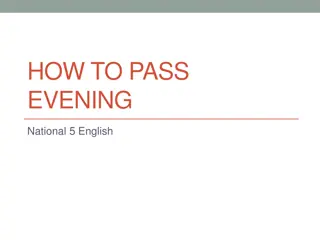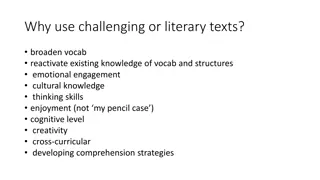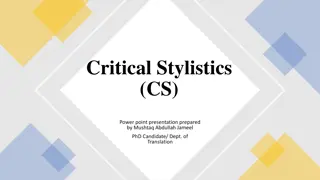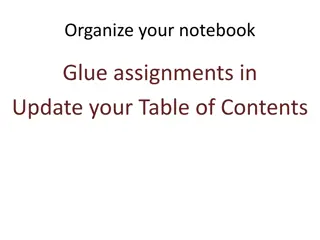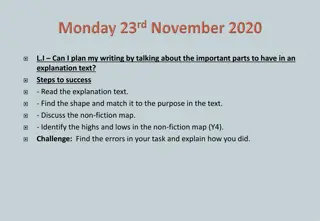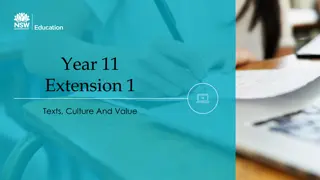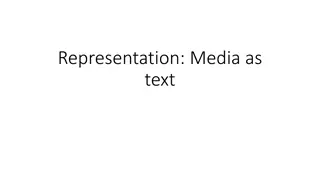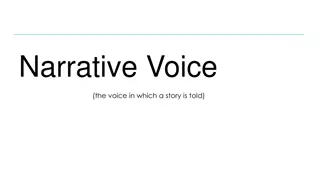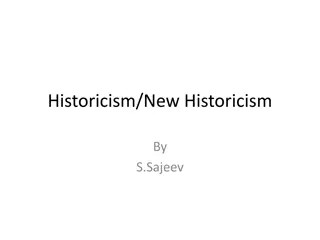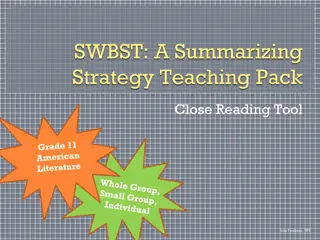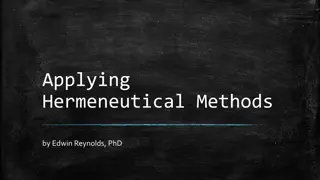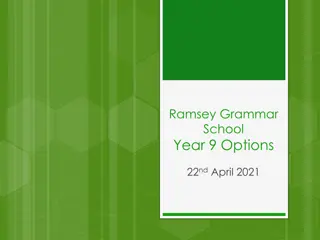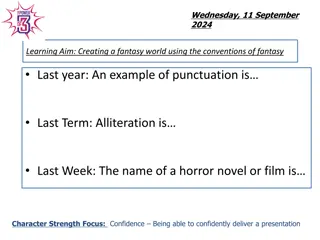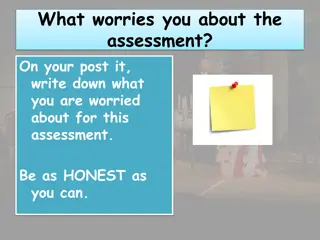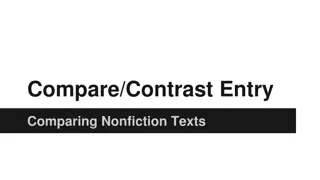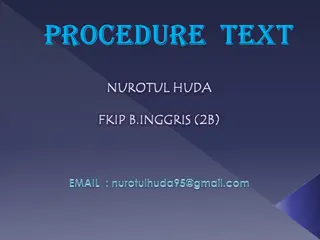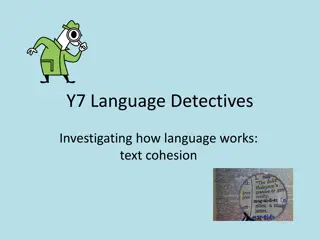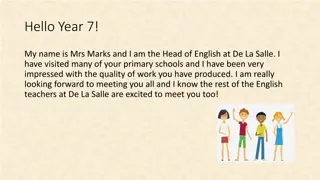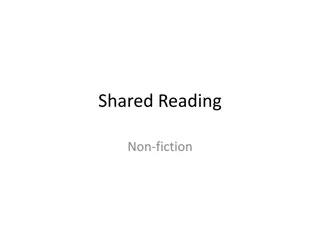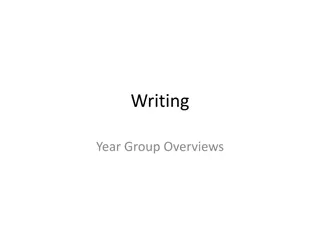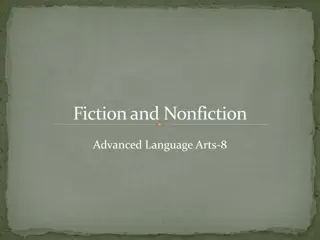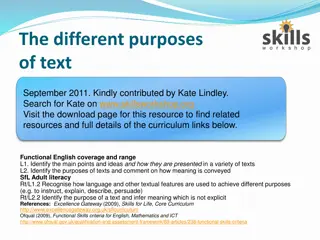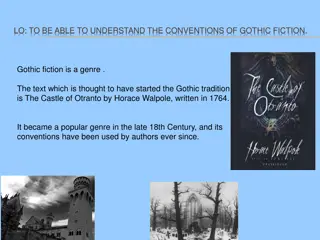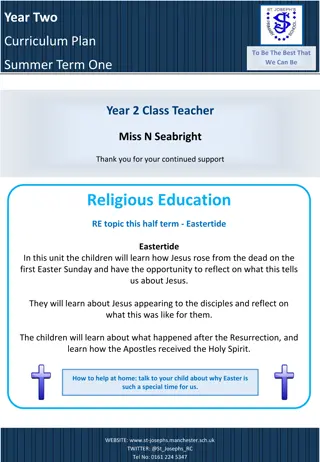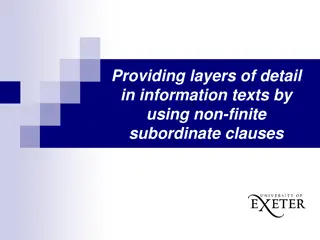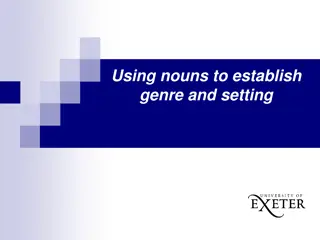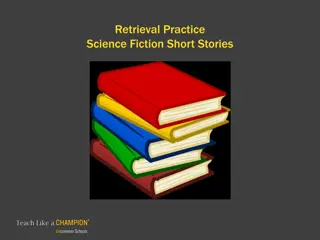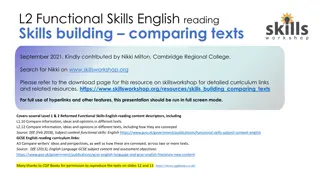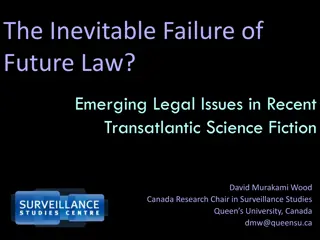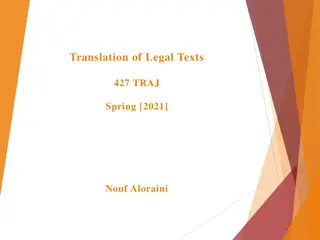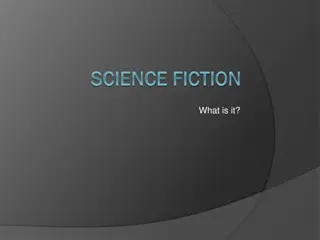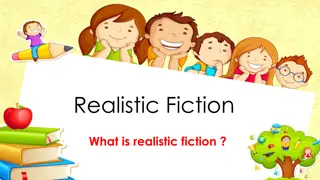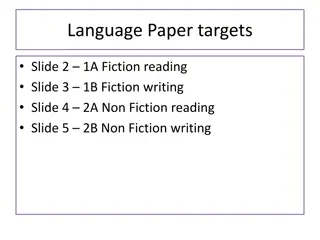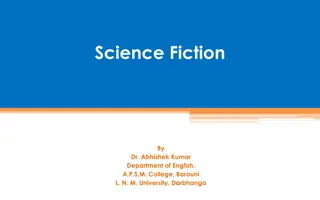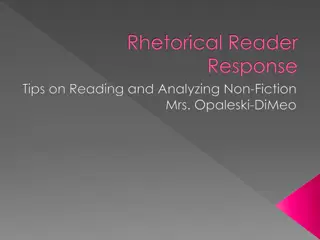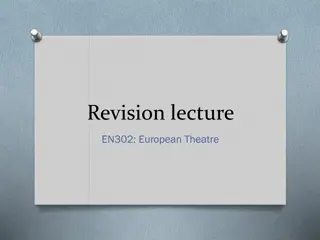Reading Opportunities at Branston Junior Academy
Discover a diverse range of reading opportunities at Branston Junior Academy for students in Year 3/4 and Year 5/6. The curriculum includes works by female and BAME authors, non-fiction, classics, and texts that challenge stereotypes. Students explore a variety of genres through engaging books like
0 views • 4 slides
Exploring Citizen Journalism and Non-Fiction Writing
Explore the world of citizen journalism and non-fiction writing, learning about text types, adapting writing to conventions, considering audience, purpose, and tone. Discover the significance and usefulness of non-fiction writing, and delve into creating various text types. Uncover the role of citiz
1 views • 11 slides
National 5 English Course Overview and Assessment Details
This National 5 English course covers detailed text analysis, critical essay writing, individual presentations, and group discussions. Students will study Scottish texts, genre texts, and non-fiction for understanding, analysis, and evaluation. Assessment includes internal assessments and a final ex
1 views • 20 slides
Enhancing Language Skills Through Challenging Literary Texts
Broaden vocabulary, reactivate knowledge, and engage emotionally with challenging literary texts to develop comprehension strategies, cultural awareness, and cognitive skills. Utilize various media sources and explicit instruction to access more complex texts, fostering creativity and cross-curricul
4 views • 28 slides
Understanding Critical Stylistics: Tools and Application
Critical Stylistics (CS) is a method that delves into the ideological underpinnings of texts through the analysis of linguistic features. Developed by Jeffries, CS focuses on uncovering implicit ideologies embedded in texts by examining stylistic choices. By integrating stylistics and critical disco
2 views • 28 slides
Exploring Historical Fiction: Elements and Examples
Discover the essence of historical fiction, its key elements, and examples like "Forrest Gump." Learn how plausibility and interpretation play pivotal roles in creating captivating narratives that blend fiction with historical events.
0 views • 11 slides
Mastering the Art of Writing Explanation Texts
Learn how to effectively plan and write explanation texts by focusing on important elements, understanding non-fiction writing, and gaining insights on structuring your content. Dive into a detailed guide on shaping your explanations and exploring topics like the water cycle or iRobot Cats. Be prepa
1 views • 11 slides
Exploring Texts, Culture, and Value Through Appropriation
In Year 11 Extension 1, students delve into texts from the past and their influence on present culture. They analyze the relationships between texts and culture, language's impact on values, and different responses to texts. Through close study, they explore key texts from the past, examining how th
0 views • 9 slides
Understanding Representation in Media Studies
Representation in media studies refers to how aspects of society such as gender, age, ethnicity, and identity are presented to audiences through media texts. These texts have the power to influence ideas and attitudes by shaping the audience's understanding of important topics. Analyzing media texts
1 views • 19 slides
Understanding Narrative Voice in Fiction Writing
Explore the elements of narrative voice in fiction writing, including tense, perspective, and language choices. Learn how authors decide on the tense and perspective for their stories, and consider different language styles that suit various characters and perspectives. Discover the nuances of first
1 views • 7 slides
Exploring Historicism and New Historicism: Perspectives on History and Literature
Understanding Historicism and New Historicism, this article delves into their definitions, perspectives on history, treatment of literary and non-literary texts, examples, and the emergence of New Historicism in the 1980s. It explores how these approaches unify cultural and social texts, challenge t
0 views • 16 slides
SWBST Summarizing Strategy Teaching Pack Overview
SWBST is a summarizing strategy designed by Julie Faulkner to help readers comprehend texts effectively. It entails breaking down texts into key components: Somebody (main character/speaker/author) Wanted (motivation), But (problem/conflict), So (solution), Then (resolution). The strategy aids in hi
0 views • 18 slides
Comparative Hermeneutics: Understanding Biblical Texts
Explore the application of hermeneutical methods on biblical texts such as Psalm 23 and 1 Tim. 2 through interpretation, translation, and contextual analysis. Delve into the meaning of texts, the role of signs and symbols, and the impact of varying presuppositions on interpretation. Reflect on the p
0 views • 46 slides
GCSE English Literature Exam Overview
This overview provides information on the GCSE English Literature exam structure, content, and assessment objectives for both components. It includes details on the texts studied, such as Shakespeare, poetry, post-1914 prose/drama, and 19th-century prose. Students are assessed on their ability to re
0 views • 23 slides
English Language Cambridge IGCSE Course Overview
Students of the Ramsey Grammar School Year 9 English Language Cambridge IGCSE course will engage in reading and analyzing various fiction and non-fiction texts, honing comprehension skills, crafting written pieces with clarity and purpose, and enhancing their ability to summarize and re-imagine cont
1 views • 7 slides
Exploring Fantasy Worlds: Conventions, Types, and Challenges
Dive into the realm of fantasy literature and learn about the conventions, types, and differences between fantasy and sci-fi. Uncover the definition of fantasy, explore popular genres, and discover sub-genres like fiction, science fiction, and historical fiction. Engage in thought-provoking challeng
0 views • 17 slides
Literature Assessment: Understanding Modern Texts and Poetry
This assessment focuses on modern texts, poetry, and unseen poetry, evaluating students' ability to analyze literary works and demonstrate understanding. Students must be prepared to write essays and respond to various types of questions within a time limit. Key areas covered include Sheila's charac
0 views • 16 slides
Analyzing Nonfiction Texts: Comparing Structures and Evidence
Explore how two nonfiction texts, "Watch Your Driving, Kids" and an Allstate Foundation video, present statistics on teen car crashes and propose solutions. Dive into the authors' text organization and credibility, unveiling similarities in the texts' structures and evidence presentation.
0 views • 10 slides
Washington Irving: Father of American Fiction and Pioneer of American Romanticism
Washington Irving, an influential American author of the early 19th century, is revered as the Father of American fiction. Known for iconic works like "The Legend of Sleepy Hollow" and "Rip Van Winkle," Irving played a crucial role in establishing American literature as an independent art form. His
1 views • 14 slides
Understanding Procedure Texts and their Structure
Procedure texts are instructional pieces of writing that explain how something works or how to perform a specific activity. They typically consist of three main definitions: texts that explain how to use something, texts that provide instructions for a particular activity, and texts that address hum
0 views • 10 slides
Understanding Text Cohesion in Non-Fiction Writing
Exploring text cohesion in non-fiction writing by analyzing how ideas are linked and sequenced clearly using key linguistic elements like nouns, pronouns, determiners, and verbs. The importance of maintaining coherence for readers to easily follow the text is highlighted through examples and explana
0 views • 8 slides
Exploring Fiction Texts: Analyzing Story Openings
Delve into the art of analyzing fiction texts through the perspective of storytelling techniques, character narratives, and structural decisions made by writers to captivate readers. Understand the impact of narrative voice, tense usage, and sentence structures on creating engaging story introductio
0 views • 10 slides
Effective Strategies for Shared Reading in Non-Fiction Settings
Shared reading in non-fiction is an effective approach to reinforce literacy skills while teaching subject-specific content. Teachers choose texts that match students' reading levels, are cross-curricular, and engaging. Discussions, predictions, vocabulary exploration, and historical context are int
0 views • 22 slides
Comprehensive Overview of English Writing Curriculum for Primary School Years Reception to Year 3
Explore a detailed breakdown of the English writing curriculum for primary school students in Reception to Year 3. From narrative stories to non-fiction texts, poetry to persuasive writing, this overview highlights the engaging units and texts used to develop children's writing skills throughout the
0 views • 10 slides
Understanding Fiction and Nonfiction in Language Arts
Fiction and nonfiction are two key genres in literature. Fiction involves imaginative storytelling with elements like plot, characters, setting, point of view, and theme. Nonfiction, on the other hand, deals with real people, events, and ideas, aiming to inform, persuade, or entertain readers. Explo
0 views • 14 slides
Understanding the Various Purposes of Texts
Explore the diverse functions of texts and how they convey meaning, from spooky holiday advertisements to cooking instructions and flu immunization details. Discover how language and textual features are used to achieve different purposes, and learn to identify implicit meanings in texts. Enhance yo
0 views • 9 slides
Understanding Gothic Fiction Conventions in Literature
Gothic fiction is a captivating genre rooted in dark, mysterious settings, supernatural elements, and eerie atmospheres. Originating with "The Castle of Otranto" by Horace Walpole, this genre has evolved to encompass elements like family curses, isolated castles, and sinister creatures. Dive into th
0 views • 25 slides
Year 2 Curriculum Plan for Summer Term - Be the Best That We Can Be
Year 2 Curriculum Plan for Summer Term involves various subjects and activities aimed at providing a well-rounded educational experience for the students. The plan includes topics such as Religious Education focusing on Eastertide, English writing featuring fiction and non-fiction texts, reading com
0 views • 4 slides
Enhancing Information Texts with Non-Finite Subordinate Clauses
Providing layers of detail in information texts involves using non-finite subordinate clauses to establish connections between grammar, meaning, and rhetorical effects. The LEAD principles emphasize linking grammar to writing purposefully, using authentic texts as models, and fostering deep metaling
0 views • 8 slides
Creative Noun Usage in Science Fiction Writing
Explore the art of using nouns to establish genre, setting, and character names in science fiction writing. Learn how authors like Philip Reeve utilize proper nouns to create immersive worlds and unique characters. Delve into the significance of authentic text, discussion, and purposeful learning pr
0 views • 10 slides
Science Fiction Retrieval Practice: Short Stories Insights
Explore futuristic technologies, incongruity, and speculative fiction elements in science fiction short stories like "Robbie" and "There Will Come Soft Rains." Uncover the connections to historical events, like the Cold War, through literary analysis of these captivating narratives.
0 views • 16 slides
Enhancing Reading Skills: Comparing Texts for English Learners
Enhance your English reading skills by comparing texts to identify similarities and differences. Practice analyzing information, ideas, and opinions in different texts, including how they are conveyed. This resource provides exercises and examples to help you develop your ability to compare and cont
0 views • 14 slides
Exploring Legal Themes in Science Fiction: The Inevitable Failure of Future Law
This study delves into emerging legal issues in recent transatlantic science fiction works by authors like Charles Stross, Ken McLeod, and Paolo Bacigalupi. It examines the portrayal of law in SF and what insights it offers about our legal systems. Through a systematic survey of over 300 novels and
0 views • 12 slides
Translation of Legal Texts Course Overview
This course provides a comprehensive overview of translating legal texts from English into Arabic and vice versa. Students will explore various types of legal texts, specialized terminology, and resources essential for accurate translation. The course covers the history of legal discourse, emphasizi
0 views • 50 slides
Exploring the World of Science Fiction
Science fiction is a genre that delves into imagined future scientific and technological advances, exploring major societal and environmental changes, space travel, time travel, and life on other planets. It combines elements of science and fiction to create believable yet captivating narratives tha
0 views • 14 slides
Understanding Realistic Fiction: Features and Examples
Realistic fiction is a genre of writing that portrays characters, settings, and events that could exist in real life, even though the story itself may be fictional. The key features include believable characters, realistic settings, everyday problems, and plausible solutions. By sorting book covers
0 views • 9 slides
Language Paper Targets for Fiction and Non-Fiction Reading and Writing
This content provides detailed targets for Language Papers, focusing on Fiction and Non-Fiction reading and writing skills. It covers strategies such as being specific in analysis, using evidence from texts, improving sentence structures, enhancing vocabulary usage, and applying language techniques
0 views • 14 slides
Evolution of Science Fiction Literature
Science fiction genre, blending imaginative fantasy with scientific principles, has evolved significantly over time. Initially emerging in the late 1800s, it gained popularity alongside technological advancements. Theodore Sturgeon highlighted the essence of human stories within the genre. Iconic wo
0 views • 8 slides
Effective College Reading and Analysis Strategies for Non-Fiction Texts
Enhance your non-fiction reading and analysis skills with these practical tips: prepare yourself mentally before reading, preview the article, highlight key points while reading, monitor comprehension, and summarize the article afterward. Additionally, learn how to create a rhetorical précis to eff
0 views • 19 slides
Exam Rubric and Guidelines for European Theatre Module
The content discusses important information regarding the exam rubric for the European Theatre module, including guidelines on time limits, permitted topics, penalties for violations, and advice on handling exam questions. It clarifies rules on writing about the same texts as in coursework essays, s
0 views • 29 slides


